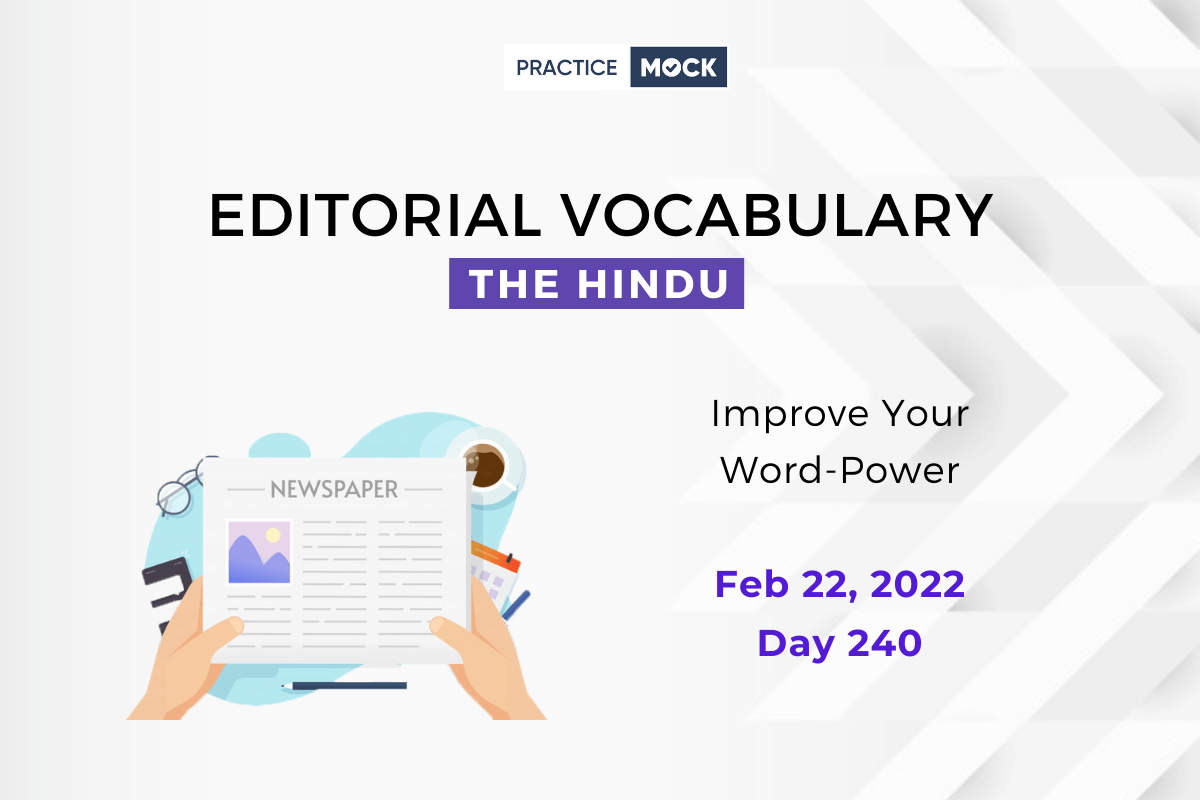| Difficult Word/ Phrase | Contextual Sense |
| Fragmented | Having been divided; having the unity destroyed |
| Depress | Cause to drop or sink |
| Anti-incumbency | A sentiment in favor of voting out incumbent politicians |
| Spurt | a sudden and short period of increased activity |
| Erstwhile | Belonging to some prior time |
| Agitation | Disturbance usually in protest |
| Viable | that can be done; that will be successful |
| Infighting | Conflict between members of the same organization (usually concealed from outsiders) |
| Resentment | A feeling of deep and bitter anger and ill-will |
| Dampen | Suppress or constrain so as to lessen in intensity |
Turnout indications: on polling in Punjab, U.P.
A fragmented (Having been divided; having the unity destroyed) polity depresses (Cause to drop or sink) turnout in Punjab; Uttar Pradesh’s polls indicate a closer battle
If recent elections are anything to go by, turnout numbers are no indication of which way the mandate is swinging. Conventional wisdom has been that high turnout numbers correspond to an anti-incumbency (a sentiment in favor of voting out incumbent politicians) effect, and indeed, a sudden spurt (a sudden and short period of increased activity) in voting numbers could indicate a wave in a particular direction. But with voter turnouts, especially among the poor, going up significantly in recent years across India, changes in turnout numbers offer little by way of explaining the outcome. The drop in voter turnout in Punjab from 77.4% in 2017 to 71.92% in 2022, however, indicates a certain frustration with the polity in the State. In the last few months, there have been drastic changes in the party system following the removal of Captain Amarinder Singh from the Chief Minister’s post, his leaving the Congress and joining hands with his erstwhile (Belonging to some prior time) arch-enemy, the BJP. The anger over the farm laws that were later repealed, was felt the most in rural Punjab and the farm agitations (Disturbance usually in protest) against the Centre’s policies should have provided a viable (that can be done; that will be successful) path for the ruling Congress to succeed. But the infighting (Conflict between members of the same organization (usually concealed from outsiders)) within the Congress and its belated but logical promotion of incumbent Charanjit Singh Channi as the “chief ministerial” candidate complicated matters for the ruling party. Reports from the ground suggested that the Aam Aadmi Party was also able to capitalise on the general resentment (A feeling of deep and bitter anger and ill-will) with the two national parties and the Shiromani Akali Dal, but the fragmentation of the polity and a general lack of clarity among them over the issues that have affected the electorate seems to have dampened (Suppress or constrain so as to lessen in intensity) voter enthusiasm in the State.
In the third phase of polling in 59 seats in central Uttar Pradesh, the voter turnout was 60.46%, marginally lower than the 62% voting in 2017 in the same seats. As with the earlier phases, there were a higher number of voters in rural areas compared to cities, a case in point being Kanpur city which registered only a 56.14% turnout. With identity politics, welfare and patronage dominating the narrative of the elections here, urban voters seemed less enthused compared to their rural brethren perhaps because of the lack of an adequate emphasis on civic issues in the political discourse. That said, ground reports from the three phases have indicated a closer contest in comparison to 2017 when the BJP had a field day sweeping district after district in the Assembly polls. Except in Bundelkhand, there has been enough of a wind behind the sails of the Opposition — the Samajwadi Party-led coalition in particular — and the high pitched third phase campaigns in the potato-growing areas are an indication that the election is not done and dusted. The relatively peaceful nature of the polls and the centering of socio-economic issues rather than religious identity bodes well for the next four phases of voting in India’s most populous State.
Want to improve your vocabulary further? Download the Lists of Word-Meanings of Previous Months here.
- Sign Up on Practicemock for Updated Current Affairs, Free Topic Tests and Free Mini Mocks
- Sign Up Here to Download Free Study Material
Free Mock Tests for the Upcoming Exams
- IBPS PO Free Mock Test
- RBI Grade B Free Mock Test
- IBPS SO Free Mock Test
- NABARD Grade A Free Mock Test
- SSC CGL Free Mock Test
- IBPS Clerk Free Mock Test
- IBPS RRB PO Free Mock Test
- IBPS RRB Clerk Free Mock Test
- RRB NTPC Free Mock Test
- SSC MTS Free Mock Test
- SSC Strenographer Free Mock Test
- GATE Mechanical Free Mock Test
- GATE Civil Free Mock Test
- RRB ALP Free Mock Test
- SSC CPO Free Mock Test
- AFCAT Free Mock Test
- SEBI Grade A Free Mock Test
- IFSCA Grade A Free Mock Test
- RRB JE Free Mock Test
- Free Banking Live Test
- Free SSC Live Test



